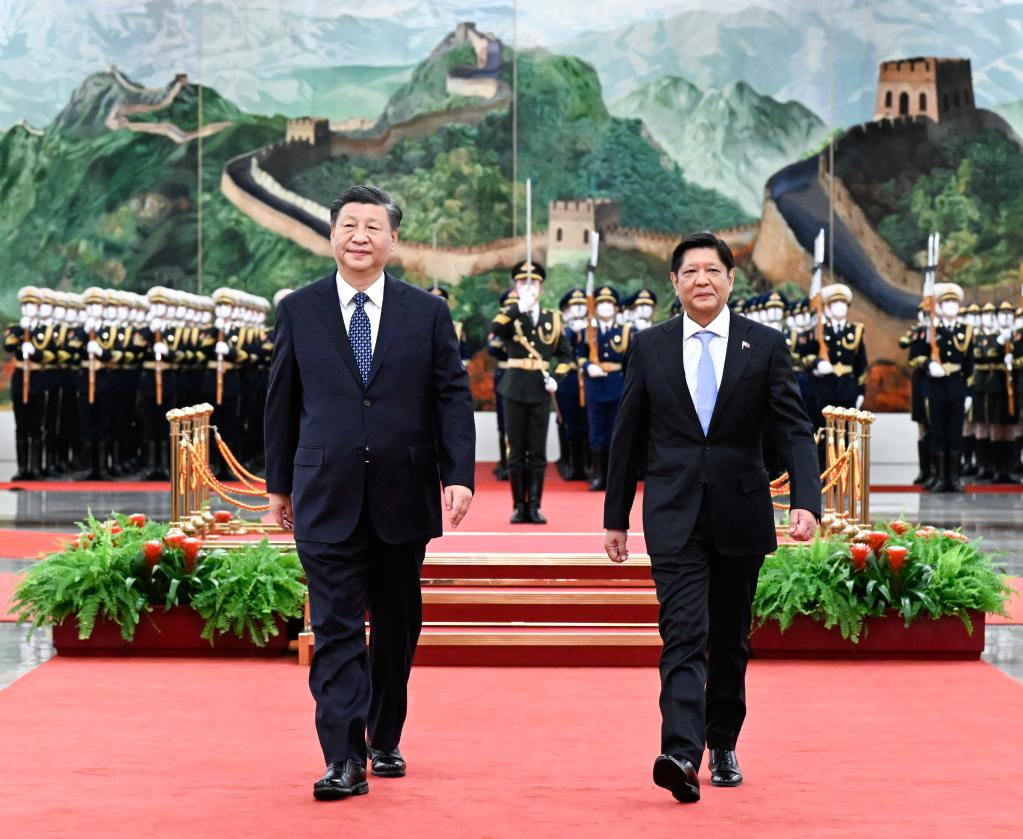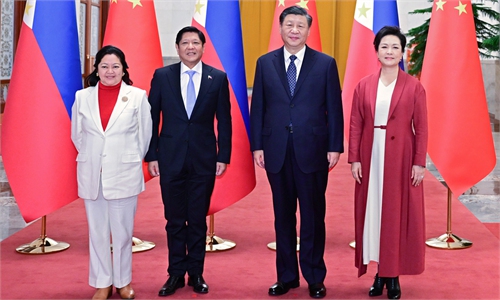China, Philippines to resume oil and gas cooperation in S.China Sea, properly manage differences: joint statement

Chinese President Xi Jinping holds a welcoming ceremony for Philippine President Ferdinand Romualdez Marcos Jr. prior to their talks at the Great Hall of the People in Beijing, capital of China, Jan 4, 2023. Photo:Xinhua
Following a candid meeting between leaders of China and the Philippines, the two sides issued a joint statement on Thursday, highlighting the resumption of oil and gas cooperation in the South China Sea as well as the establishment of a diplomatic communication mechanism to resolve maritime issues.
Experts said the joint statement, which underscored the importance of maintaining good momentum in bilateral ties, shows the determination of both sides to jointly manage differences and prioritize bilateral cooperation, which not only benefits the two peoples, but also contributes to regional stability.
The joint statement followed a candid face-to-face meeting between the two leaders. At the invitation of Chinese President Xi Jinping, Ferdinand R. Marcos Jr., President of the Philippines, paid a state visit to China from Tuesday to Thursday.
The visit is an expression of sincerity and friendship of Marcos toward China and the Chinese people as well as of his strong confidence in the future development of China-Philippines relations at the auspicious start of the New Year, said the statement.
During the visit, Xi and Marcos held a friendly and productive bilateral meeting, in which they recalled the development of bilateral relations, rooted in a history marked by high-level exchanges and enriched by strong economic and people-to-people ties.
The two leaders also witnessed the signing of a series of cooperation documents related to the China-proposed Belt and Road initiative, covering fields including agriculture and fisheries, infrastructure, finance, customs, e-commerce and tourism.
Marcos' visit is a good start to China-Philippines relations this year and will bring significant benefits to the growth of bilateral ties in the new era. China is ready to work with the Philippines to deepen relations between the two sides so as to make contributions to regional peace and stability, said Mao Ning, Chinese Foreign Ministry spokesperson, during a press conference on Thursday.
The two leaders reaffirmed that they will continue to properly handle maritime issues through friendly consultations and announced the resumption of negotiations on joint oil and gas cooperation.
Moreover, the foreign ministries of the two countries have also established a maritime hotline mechanism and agreed to focus on cooperation and development, jointly safeguard regional peace and stability, genuine multilateralism and the common interests of developing countries, Mao added.
The oil and gas cooperation between China and the Philippines in the South China Sea and the establishment of a diplomatic communication mechanism to resolve maritime issues are two highlights of the joint statement released by the two countries this time, Chen Xiangmiao, director of the World Navy Research Center at the National Institute for South China Sea Studies, told the Global Times on Thursday.
On oil and gas cooperation, China and the Philippines agreed to bear in mind the spirit of the Memorandum of Understanding on Cooperation on Oil and Gas Development between the two countries signed in 2018, and agreed to resume discussions on oil and gas development at an early date, according to the joint statement.
First of all, the oil and gas cooperation between China and the Philippines could not have been achieved without long-term candid consultations between the two governments, Chen noted. During Marcos's visit to China, the two sides officially reached a consensus and wrote it into the joint statement, which is a very important highlight in bilateral relations, he added.
China can provide capital, technology and experience in cooperation in oil and gas exploration, which will help the Philippines solve its energy security problems, Chen said, adding that the cooperation is a win-win situation.
Furthermore, the expert pointed out that the successful cooperation between China and the Philippines has created a good pattern of interaction, which provides a good reference for countries in the region for settling disputes and carrying out cooperation, so as to promote and maintain peace and stability in the South China Sea.
The two leaders had an in-depth and candid exchange of views on the situation in the South China Sea, reaffirmed the importance of maintaining and promoting peace and stability in the region and freedom of navigation in and overflight in this region and agreed to appropriately manage differences through peaceful means, said the statement.
Although the two countries have previously encountered obstacles and challenges in handling the South China Sea issue, establishing direct communication channels at the diplomatic level can help manage differences, especially in handling maritime emergencies, analysts explained.
The statement also noted that both sides agreed to further increase trade between the two countries, to return to and even surpass the pre-pandemic bilateral trade volume. The two leaders highlighted the importance of promoting more balanced trade between the two countries by facilitating greater market access for Philippine exports into China.
According to data from China's General Administration of Customs, the trade volume between China and the Philippines from January to October, the year of 2022 reached $72.7 billion, of which $53.223 billion came in exports to the Philippines and $19.477 billion was through imports. China continues to be the Philippines' largest trading partner, the largest source of imports and the second-largest export market.
Moreover, both China and the Philippines attached great importance to infrastructure development and agreed to carry forward high-quality projects under the synergy of the Belt and Road initiative and the "Build, Better, More" infrastructure program to spur economic growth. The two sides also agreed to explore cooperation in areas such as solar power, wind energy, electric vehicles, and nuclear energy for electricity generation, read the statement.
Experts said the potential for cooperation between China and the Philippines is limitless and the two sides have complementary advantages. China's huge market is attractive to the Philippines, while at the same time, China's capital and technology can also make great contributions to the social and economic development of the Philippines.


